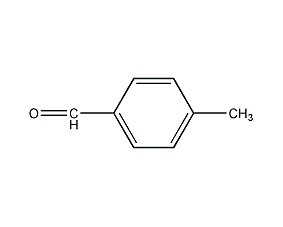
Structural formula
| Business number | 02QV |
|---|---|
| Molecular formula | C8H8O |
| Molecular weight | 120.15 |
| label |
4-methylbenzaldehyde, 4-Methyl-Benzaldehyde |
Numbering system
CAS number:104-87-0
MDL number:MFCD00006954
EINECS number:203-246-9
RTECS number:CU7034500
BRN number:385772
PubChem number:24901194
Physical property data
1. Properties: colorless liquid, with gentle floral and almond aroma.
2. Density (g/mL, 25℃): 1.0194
3. Relative density (20℃, 4℃): 1.0190
4. Melting point (ºC): -6
5. Boiling point (ºC, normal pressure): 106 (1333pa)
6. Boiling point (ºC, 8mmHg): 204-205
7. Refractive index (n20D): 1.5454
8. Flash point (ºC): 85
9. Refractive index at room temperature (n20): 1.5454
10. Autoignition point or ignition temperature (ºC): 395
11. Liquid phase standard hot melt (J·mol-1·K-1): 215.2
12. Saturated vapor pressure ( kPa, ºC): Undetermined
13. Heat of combustion (KJ/mol): Undetermined
14. Critical temperature (ºC): Undetermined
15. Critical pressure (KPa): Undetermined
16. Log value of oil-water (octanol/water) distribution coefficient: Undetermined
17. Explosion upper limit (%, V/ V): 5.6
18. Lower explosion limit (%, V/V): 0.9
19. Solubility: miscible with ethanol, ether and acetone, slightly soluble in water .
Toxicological data
1. Skin/eye irritation: Standard Dresser test: rabbit skin contact, 500mgREACTION SEVERITY, moderate reaction; Standard Dresser test: rabbit eye contact, 100mgREACTION SEVERITY, moderate reaction; 2. Acute toxicity: rat oral LD50 : 1600mg/kg; Rat inhalation LC: >2200mg/m3; Rat peritoneal cavity LD50: 800mg/kg; Mouse oral LD50: 3200mg/kg; Mouse peritoneal cavity LD50: 400mg/kg; 3 .Acute toxicity:
Oral LD50 3200mg/kg(mus)
1600 mg/kg(rat)
Skin LD50 2500mg/kg(rat)
Inhalation LC >2200000ug/m3(rat)
Eye irritation moderate 500mg(rbt)
Main irritating effects:
On the skin: Irritation to skin and mucous membranes
On the eyes: Irritating effects
Sensitization: No known sensitizing effects
Ecological data
General remarks
Water hazard level 1 (German regulations) (self-assessment via list) This substance is slightly hazardous to water.
Do not allow undiluted or large amounts of product to come into contact with groundwater, waterways or sewage systems.
Do not discharge materials into the surrounding environment without government permission.
Molecular structure data
1. Molar refractive index: 37.83
2. Molar volume (cm3/mol): 117.3
3. Isotonic specific volume (90.2K ): 289.9
4. Surface tension (dyne/cm): 37.2
5. Dielectric constant: 2.27
6. Dipole moment (10-24cm3):
7. Polarizability: 14.99
Compute chemical data
1. Reference value for hydrophobic parameter calculation (XlogP): None
2. Number of hydrogen bond donors: 0
3. Number of hydrogen bond acceptors: 1
4. Number of rotatable chemical bonds: 1
5. Number of tautomers: 4
6. Topological molecule polar surface area 17.1
7. Number of heavy atoms: 9
8. Surface charge: 0
9. Complexity: 90.7
10. Number of isotope atoms: 0
11. Determine the number of atomic stereocenters: 0
12. Uncertain number of atomic stereocenters: 0
13. Determine the number of chemical bond stereocenters: 0
14. Number of uncertain chemical bond stereocenters: 0
15. Number of covalent bond units: 1
Properties and stability
1. Avoid contact with oxidants and air.
2. Exist in smoke.
3. Found in certain things, such as rice, tomatoes, and beer.
Storage method
Store in a cool, ventilated warehouse. Keep away from fire and heat sources. should be kept away from oxidizer, do not store together. Store away from air. Equipped with the appropriate variety and quantity of fire equipment. The storage area should be equipped with emergency release equipment and suitable containment materials.
Synthesis method
1. Using toluene as raw material, first chloromethylate it, and then follow the Sommelet reaction method to obtain p-tolubenzaldehyde.
Purpose
1. Organic synthesis intermediates.
2. Can be used to prepare flavors such as lily of the valley, clove, lily, coconut, almond, etc.

 微信扫一扫打赏
微信扫一扫打赏

